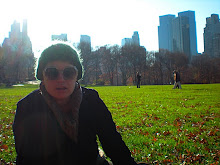comically escorted to the police car
his instrument abandoned beside two mattresses
at the curb with the garbage,
the reporters, his wife. if i were her
i would not rescue that wooden bass.
in his space with his
small, white daughter. feeding her
wine, rants...
'in this country they'd call me
a nymphomaniac.' erect
for three days, minimum. he teaches her
how to rip thick rope,
split it into pieces with her bare hands.
speaks to a five-year-old
like a grown woman. and if i looked back
would my childhood be much different.
father teaches her how to enjoy
dark beer and piano players.
'and when you grow up, how many men
will you love... say it again.'
one man. speech that is all
poetry, all contradictions, all
up on that soap box. i want
to hear these same words from someone else.
waving around an ancient rifle.
(his son will wail 'too many bullets
not enough soul.')
with a camera in his face
'i hope you all get blown up by the communists.'
when they come for him
a brassy bass sound
by fat fingers pulling like falling.
used gravity in his favor.
audience that doesn't know when to clap,
when to shut up and listen.
listen to that man with cameras
in his face. says he speaks for all negroes.
a temper turns revelation to lunacy.
'no education,' he says. a big, angry, sexed-up, black
jazz musician man. small, white girl.
large, black rifle. large, brown bass.
it's hard to hear when you're white. it's hard
to know what to say when you're an example.
all instinct, no discipline in the mouth.
and why should he be different
than the rest of us. sinking
in my chair. hope for compassion behind
the audiences' laughter. oh, the comedy! the tragedy!
the cops are the two to his third stooge.
the bass-- the greek chorus. 'the victims,'
he says, 'which they call citizens...'
they are going to throw out his instrument.
.jpg)
